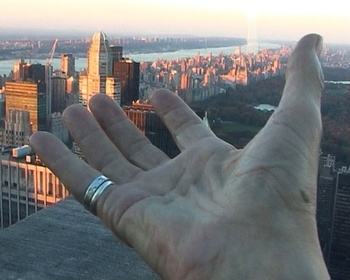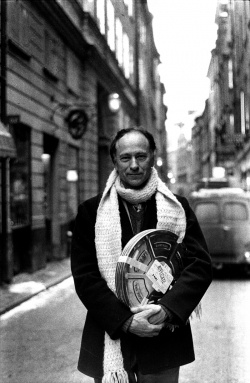In case you didn’t notice: Lithuania currently holds the presidency of the Council of the European Union. The country’s presidency is being celebrated with a number of exhibitions and events. One of the highlights is an exhibition devoted to Jonas Mekas and the Fluxus movement at Bozar. Cinematek, for its part, is presenting a retrospective of Mekas’s films.
Jonas Mekas has been called the “grandfather of avant-garde cinema”. Although the Lithuanian artist is now ninety, he is not resting on his laurels yet. Following exhibitions in the Serpentine Gallery in London and the Centre Pompidou in Paris, you can now see his work in Brussels. He is known for his often grainy, rapidly shot films with their characteristic jump cuts. They look like home movies and are odes to the poetry of the commonplace. But Mekas’s own life has not been so commonplace, unless you think it’s routine to have people like Yoko Ono and Andy Warhol dropping into your house. The film-maker left his homeland after it was occupied by the Soviet Union and spent a few years in German prison camps before heading for New York. After two weeks there, he bought a camera. Since then, he has never stopped filming what he sees around him. As in Lost Lost Lost, for example, which records the daily life of the Lithuanian community in New York. But he has also been an influential critic of underground cinema and a leading light of the US avant-garde.
Jonas Mekas: the poetry of the commonplace

(© Jonas Mekas, from 365 Days, April 19)
Among the events filmed by Mekas were a performance by Salvador Dalí in the streets of New York and John Lennon’s birthday party. “Mekas is not someone who repeats himself,” according to Lolita Jablonskiene, director of the National Gallery of Art in Vilnius and co-curator of the Bozar
Among the events filmed by Mekas were a performance by Salvador Dalí in the streets of New York and John Lennon’s birthday party. “Mekas is not someone who repeats himself,” according to Lolita Jablonskiene, director of the National Gallery of Art in Vilnius and co-curator of the Bozar

exhibition. “He constantly reinvents himself. He now works digitally too. And in this exhibition he presents a new installation, as well as photographs that have never been shown before.” Sometimes he edits fragments of film some decades later. As he did for his superb WTC Haikus, which brings together footage taken over many years with, as a thread running through the film, the Twin Towers constantly visible in the background. The film is, among other things, a – visionary – declaration of love for New York. At Bozar, in addition to films, you can also see photographs, poems, and installations. Alongside the theme of Lithuania as a paradise lost, the exhibition includes photographs and videos of family and friends. The exhibition ends with a chapter about “now”, a theme that, thanks to the spontaneity of Mekas’s films, runs right through his oeuvre.
Lithuania was also the cradle of the Fluxus movement. The term was invented by George Maciunas, a friend of Mekas who also started off in Lithuania and played a role in the New York avant-garde. Fluxus was an artistic movement that, following in the footsteps of Dada, set out to demolish boundaries between art and daily life through subversive performances. The exhibition “The Fluxus Wall” presents photographs and documentation of performances by Maciunas and co. Mekas often took part in those performances and filmed them. But he was no die-hard member. “He had a different, stronger interest,” says co-curator Liutauras Psibilskis. “That is to say, the development of independent cinema and a distinctive cinematographic idiom.” And that he did successfully and with verve, as can be seen from the overview on offer at Bozar and Cinematek.
JONAS MEKAS/THE FLUXUS WALL 18/10 > 26/1, di/ma/Tu, wo/me/We, vr/ve/Fr > zo/di/Su 10 > 18.00, do/je/Th > 21.00, gratis/gratuit/free, Bozar, rue Ravensteinstraat 23, Brussel/Bruxelles, 02-507.82.00, www.bozar.be
Lithuania was also the cradle of the Fluxus movement. The term was invented by George Maciunas, a friend of Mekas who also started off in Lithuania and played a role in the New York avant-garde. Fluxus was an artistic movement that, following in the footsteps of Dada, set out to demolish boundaries between art and daily life through subversive performances. The exhibition “The Fluxus Wall” presents photographs and documentation of performances by Maciunas and co. Mekas often took part in those performances and filmed them. But he was no die-hard member. “He had a different, stronger interest,” says co-curator Liutauras Psibilskis. “That is to say, the development of independent cinema and a distinctive cinematographic idiom.” And that he did successfully and with verve, as can be seen from the overview on offer at Bozar and Cinematek.
JONAS MEKAS/THE FLUXUS WALL 18/10 > 26/1, di/ma/Tu, wo/me/We, vr/ve/Fr > zo/di/Su 10 > 18.00, do/je/Th > 21.00, gratis/gratuit/free, Bozar, rue Ravensteinstraat 23, Brussel/Bruxelles, 02-507.82.00, www.bozar.be
Fijn dat je wil reageren. Wie reageert, gaat akkoord met onze huisregels. Hoe reageren via Disqus? Een woordje uitleg.